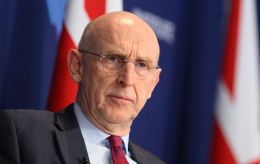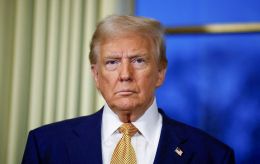Decisive week: Zelenskyy's U.S. visit purposes and expected outcomes of meeting with Biden
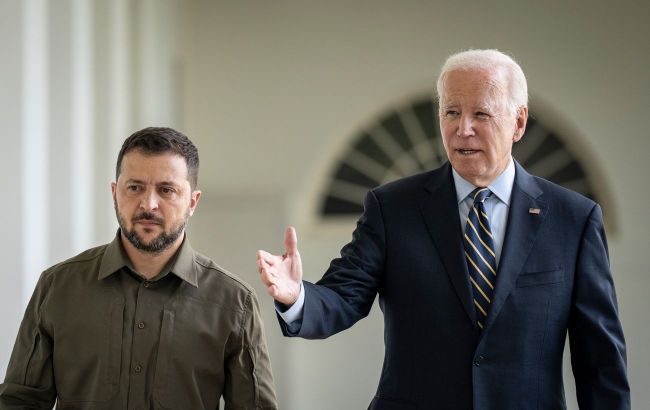 Volodymyr Zelenskyy will visit the USA tomorrow and meet with Joe Biden (Photo: Getty Images)
Volodymyr Zelenskyy will visit the USA tomorrow and meet with Joe Biden (Photo: Getty Images)
Ukrainian President Volodymyr Zelenskyy is heading to the United States once again. Tomorrow, on December 12, American leader Joe Biden will host him at the White House ahead of crucial negotiations in Congress that will determine financial and military support for our country.
More details about the meeting and what to expect from Zelenskyy's visit are in the material by RBC-Ukraine.
The preparation of this material involved: announcements from the Office of the President and the White House, statements by Ukrainian President Volodymyr Zelenskyy, material from Reuters, CNN, and The Wall Street Journal, and commentary by political analyst Volodymyr Fesenko for RBC-Ukraine.
Zelenskyy's unexpected tour: From Argentina to the USA
Over the weekend, Zelenskyy traveled to attend the inauguration of Argentina's new president, Javier Milei. En route to Buenos Aires, the first-ever bilateral meeting with the Prime Minister of Cape Verde took place, whom he invited to join the implementation of the Ukrainian Peace Formula and thanked for supporting democracy at the UN platforms.
The trip to Argentina also marked Zelenskyy's first visit to the South American continent. According to Reuters, the aim was to secure support from Global South countries, hoping to advance a peace formula based on the withdrawal of Russian troops and a return to 1991 borders. Additionally, Milei's inauguration provided a convenient opportunity for meetings with other leaders.
Notably, negotiations were held with French President Emmanuel Macron. Discussions revolved around the upcoming defense package aimed at significantly strengthening the firepower of the Ukrainian Armed Forces and the importance of initiating talks on Ukraine's EU accession at the summit on December 14-15. The Peace Formula issue was raised in meetings with the leaders of Uruguay, Paraguay, and Ecuador.
During the inauguration itself, Zelenskyy briefly conversed with Hungarian Prime Minister Viktor Orban. According to Zelenskyy, discussions about European matters were candid and clear. It's worth mentioning that last week, Orban repeatedly stated that the European Council summit should not discuss the start of negotiations for Ukraine's accession. According to Euractiv, Budapest's position might delay the official start until March 2024.
 Photo: Volodymyr Zelenskyy will head to the USA after a trip to Argentina (Getty Images)
Photo: Volodymyr Zelenskyy will head to the USA after a trip to Argentina (Getty Images)
During his meeting with Javier Milei, Zelenskyy received signals regarding future support for Ukraine's fight against Russian aggression. Following this, it became known that the president, for the third time since the full-scale war began, would visit the USA, especially given that his previous trip was in September.
The Office of the President states that the working visit will commence on December 11. It includes a series of meetings and negotiations. Joe Biden will host the Ukrainian president at the White House on Tuesday, December 12. CNN, citing sources, reports that Senate leaders Chuck Schumer and Mitch McConnell have invited Zelenskyy to meet with senators. Additionally, talks with House Speaker Mike Johnson (Republican Party) are planned.
According to political analyst Volodymyr Fesenko, the formal trip to Washington was unexpected.
"I think it's primarily related to logistics. Zelenskyy decided that if he had to make a long journey across the ocean to Latin America, he could take advantage of the opportunity and visit the USA, considering the critical importance of American assistance for Ukraine. Recently, our government delegation was in Washington at a defense industry conference. I believe the possibility of Zelenskyy's visit might have been discussed last week," he notes in a conversation with RBC-Ukraine.
The primary goal is to push Congress for assistance to Ukraine
In Fesenko's opinion, several tasks will be addressed during the visit to Washington. Firstly, it involves providing a political boost to the issue of additional funding for Ukraine. Through meetings with senators and creating informational leverage, Zelenskyy will try to encourage the Senate to make a positive decision.
"There is a problem that everyone needs to understand. Unfortunately, not everything depends solely on us. The problem is not with Ukraine, not that someone is against assistance. This is an internal political problem, differences in the fundamental issue of the Mexican border and changes in immigration legislation. And we, Israel, and to some extent, Taiwan have become hostages of this conflict," emphasizes the political analyst.
According to him, the sense of Zelenskyy's meeting with senators is to explain the difficult situation on the front and why it is essential to vote for assistance as soon as possible. The President of Ukraine will emotionally and rationally try to convince Congress representatives. It is possible that there will be other information campaigns to persuade American society of the necessity of maintaining support, as ultimately, it aligns with the interests of the USA.
It's worth noting that today essentially marks the start of a decisive week in the Senate. According to The Wall Street Journal, Zelenskyy's visit, along with the senators' announcement that they are rushing to agree on an emergency aid package of over $110 billion for allies and measures to combat record illegal migration, intensifies the situation and increases pressure. Approximately $60 billion from this amount is earmarked for Ukraine.
"Vladimir Putin is delighting right now in Republicans’ insistence that we get a deal on immigration reform. And if we don't, then they are going to allow Vladimir Putin to march into Ukraine and perhaps into Europe. I think this is one of the most dangerous moments that I've ever faced in American politics," said Senator Chris Murphy (Democrat from Connecticut) on NBC.
Republican Senator James Lankford (Oklahoma) emphasized the increasing number of illegal border crossings from Mexico.
"We can't just sit and say we're going to do nothing," he said on CBS's Face the Nation program.
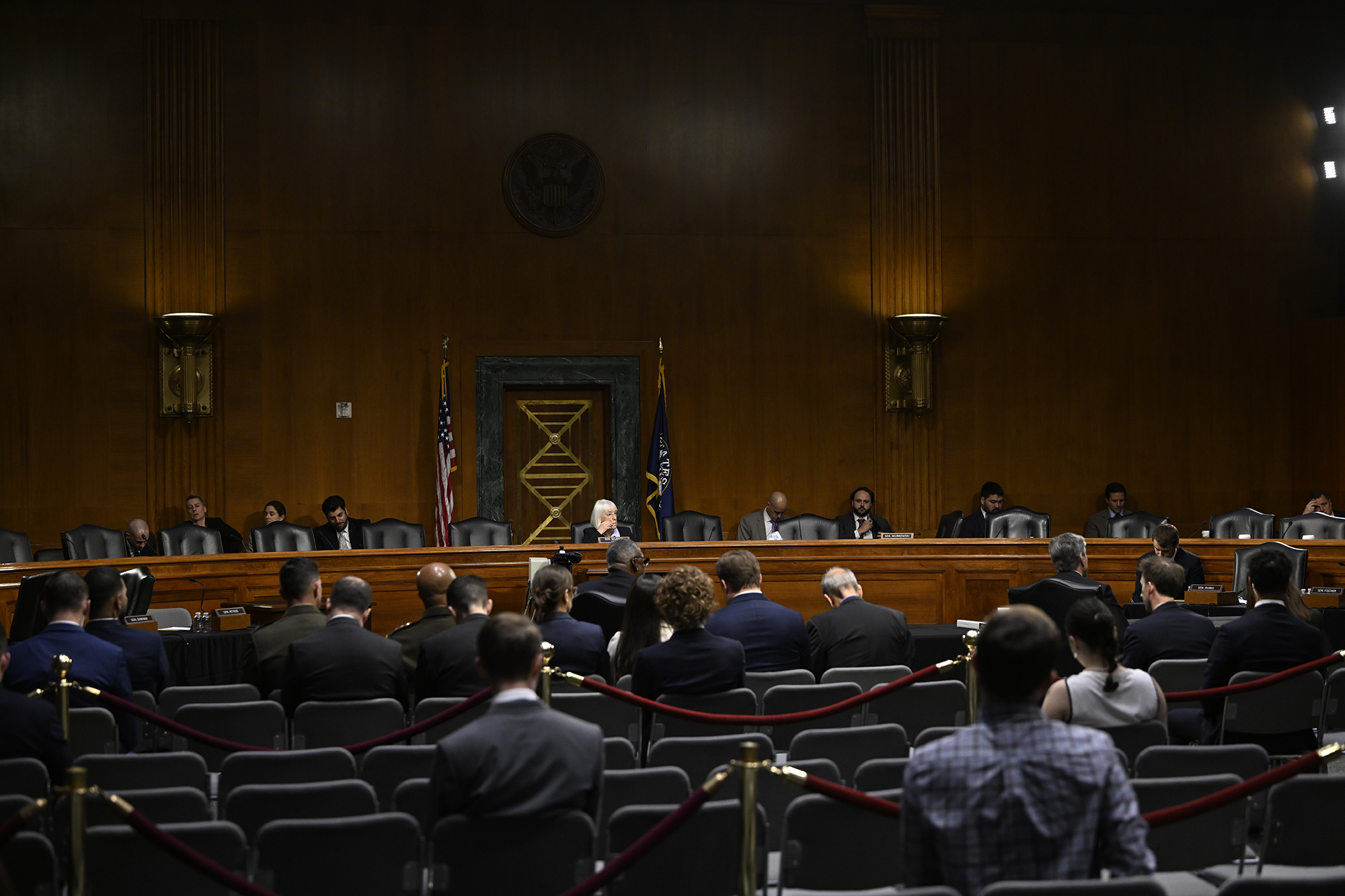
Photo: A closed Senate briefing last week led to disagreements and the collapse of the initiative for over $110 billion (Getty Images)
Negotiations for an agreement entail finding a balance amid high stakes. The White House has already warned Congress that the funding for Ukraine's military needs in repelling the Russian invasion will be depleted by the end of 2023. If the agreement fails, the issue will remain unresolved, as senators are heading into Christmas holidays.
Both Democrats and Republicans agree that immigration policy should be stricter. However, Joe Biden risks alienating part of the Democratic camp if he makes too many concessions. Republicans insist on radical limitations on the flow of migrants, tying the funding for these measures to security assistance for Ukraine, Israel, and Taiwan. Despite most Republican senators supporting aid, last week the party blocked a version that did not contain measures regarding border policy. Notably, President Volodymyr Zelenskyy was supposed to speak at a closed briefing, but after discussions in the Senate turned into continuous disputes, his appearance became inappropriate.
"Now is precisely the time for Zelenskyy not to participate in a conflictual discussion. The dispute wasn't about Ukraine but immigration issues. In this sense, it's advantageous for us that the president can meet personally and respond to questions in a calmer atmosphere. The issue of the Mexican border is not ours, and we won't interfere. What's important to understand is that the decision on aid to Ukraine will be made not only by the Senate but also by the US House of Representatives, with less than a week left," explains Volodymyr Fesenko.
Negotiations have been ongoing for several weeks with little progress. However, it was recently revealed that Joe Biden is willing to discuss significant concessions. Among them are changes to asylum law to strengthen standards for migrant case pre-screening. The White House also hinted at being willing to send migrants to "safe third countries" and expand rapid deportation capabilities, to be used across the country, not just at the border.
Republicans demand stricter measures. They ask to add new powers to halt asylum processing directly at the border, as was done during the COVID-19 pandemic. Additionally, they propose mandatory detention for applicants and, when space runs out, implement the "remain in Mexico" policy for migrants. They also suggest limiting humanitarian parole. This is a tool used by the Biden administration to expedite the admission of Afghans and Ukrainians who registered beforehand.
According to the WSJ, the number of daily border crossings has exceeded 10,000, and the US border service is overwhelmed. Migrants are held for several days in makeshift waiting areas in open air, not at border posts. White House Budget Director Shalanda Young urges Democrats and Republicans to come to an agreement.
"You can't have everything your way in a negotiation. Democrats and Republicans have to vote for this bill. It's time to cut a deal that both sides can agree to," she stated.
In an interview with Latin American media, Zelenskyy expressed confidence that Ukraine would overcome the pause in US aid caused by discrepancies in Congress. The planned negotiations may assist in this regard.
What Zelenskyy and Biden will discuss
The Office of the President of Ukraine has announced that Zelenskyy will focus on ensuring unity between the US, Europe, and the world around support for Ukraine in defending against Russian terror. This includes strengthening the international order based on rules and respect for the sovereignty of each nation. Key topics will involve continuing Ukraine-US defense cooperation, particularly joint projects in arms production and missile defense systems, as well as coordinating efforts between Zelenskyy and Biden for the coming year.
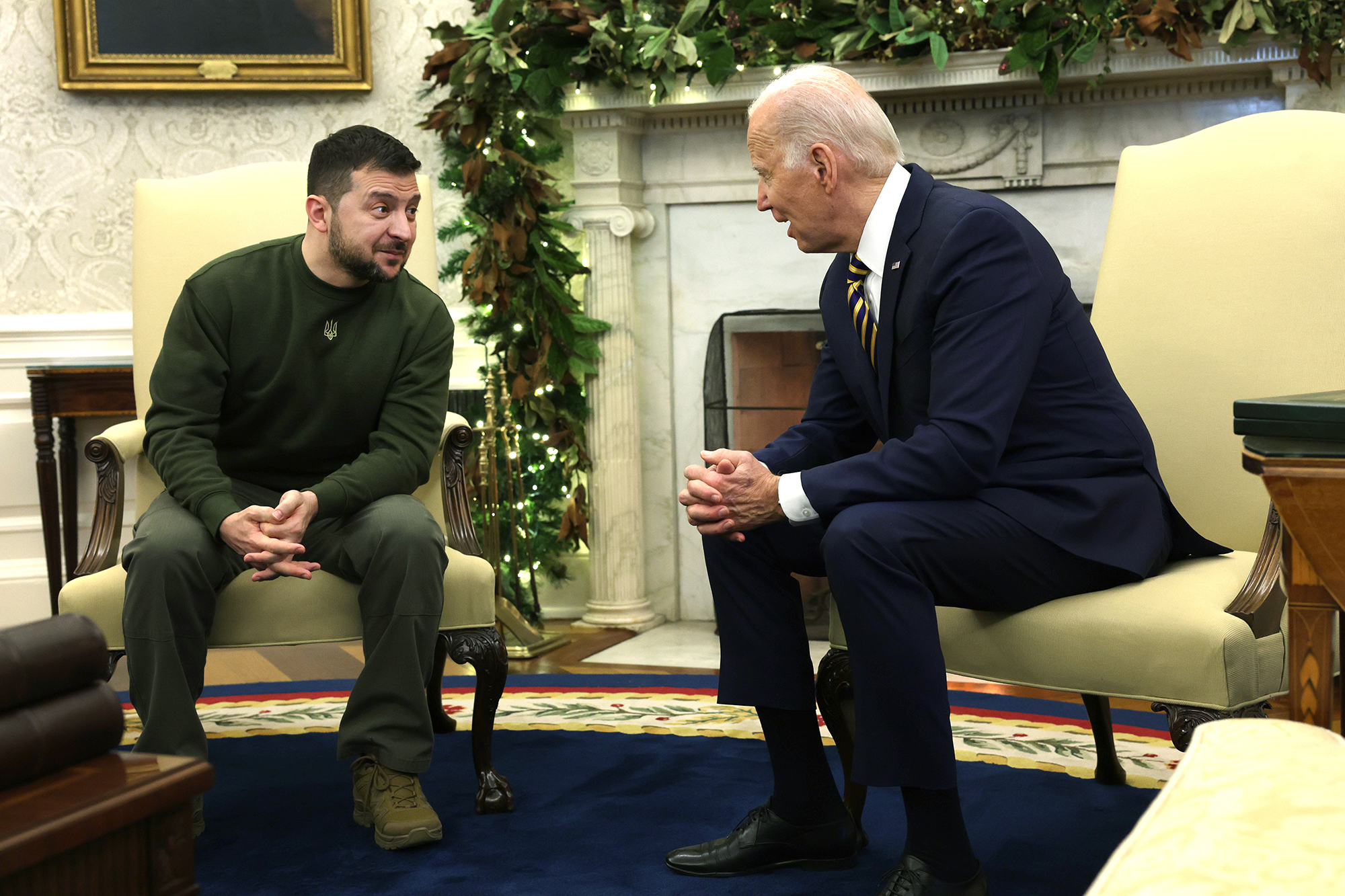 Photo: Volodymyr Zelenskyy and Joe Biden may discuss unexpected issues (Getty Images)
Photo: Volodymyr Zelenskyy and Joe Biden may discuss unexpected issues (Getty Images)
According to White House spokesperson Karine Jean-Pierre, the meeting between the presidents will take place on December 12.
"To underscore the United States’ unshakeable commitment to supporting the people of Ukraine as they defend themselves against Russia’s brutal invasion. As Russia ramps up its missile and drone strikes against Ukraine, the leaders will discuss Ukraine’s urgent needs and the vital importance of the United States’ continued support at this critical moment," she emphasized.
During the meeting with Biden, alternate options might be discussed, believes Volodymyr Fesenko. For example, what to do if the problem cannot be resolved in Congress. In that case, an agreement should be reached on assistance for the next month or two.
"The second is a more strategic task - the coordination of a comprehensive political strategy for the next year, related to systemic support for Ukraine. What needs to be done, how to help us so that we at least withstand the increased Russian pressure, and if possible, turn the situation in our favor," he emphasizes.
Discussion of our country's Euro-Atlantic integration in the context of the NATO summit next year in Washington and security guarantees is not excluded. Additionally, the parties may raise the issue of peace talks with Russia, their strategy, and tactics if Ukraine fails to break the situation on the front in 2024.
"There is nothing wrong here; different options should be considered. A strategic pause in the war may be extremely necessary for us. Someone may not like it, but such a need may arise. And therefore, it is necessary to think in advance about a negotiating option that would be acceptable to us. And also determine what things will be unacceptable in the negotiation process," the political scientist adds.
In an interview with Latin American media, Volodymyr Zelenskyy noted that he does not envisage negotiations with Vladimir Putin and called him a killer. He also ruled out the possibility of any compromise with the Russian dictator, who does not want peace, an independent Ukraine, and whose word is worth nothing.
What to expect from the visit of the President of Ukraine to Washington
Joe Biden, Democrats, and many senators call this week pivotal as all efforts will be mobilized to reach an agreement. Meanwhile, Republicans emphasize that they are not against helping Ukraine and support the package but on their terms, if measures regarding the border with Mexico are voted on. The question is whether Biden's request will be fully met and what nuances may arise.
The Head of the Сenter of Military Law Researches, Oleksandr Musiienko, leans toward the idea that the parties will reach an agreement, and there are more and more signals now about the potential for a deal.
"The situation needs to be viewed through the lens of domestic political circumstances and the fact that this is an election year in the U.S. All issues related to funding not only Ukraine but also partners in Taiwan, Israel, and Southeast Asian countries are in a suspended state. But based on the signals we're receiving, agreements on the border with Mexico may be reached. I think that by the end of the year, perhaps even by Christmas, assistance to Ukraine will be voted on," he notes in a telethon broadcast.
Political scientist Volodymyr Fesenko is more restrained in his predictions. In his opinion, the biggest mistake of Ukrainian officials in 2023 was making public forecasts about the military situation, European integration, and so on. He also emphasizes that the situation depends not on Ukraine but on whether Republicans, Democrats, and the White House will find a compromise.
"Will they find this compromise in the coming days? Then there will be a chance for aid to be voted on. If they don't find it, unfortunately, there is a high risk that it won't be voted on. Both sides have taken a stand; Republicans demand the border first, and then everything else. Except for the most staunch opponents, they are not against helping Ukraine. Even the Speaker of the House, Mike Johnson, supports it, although he criticized it earlier," he tells RBC-Ukraine.
However, even a negative scenario does not mean that the U.S. will stop military support for Ukraine. An alternative option may resemble how Washington cooperates with Israel when arms are supplied without the need for a vote in Congress. It's difficult to say exactly what President Zelenskyy will bring back from the U.S. His task is to convince partners that further delay in assistance is no longer possible, the deliveries have already slowed down, and the Armed Forces are facing a shortage of ammunition, Fesenko sums up.
